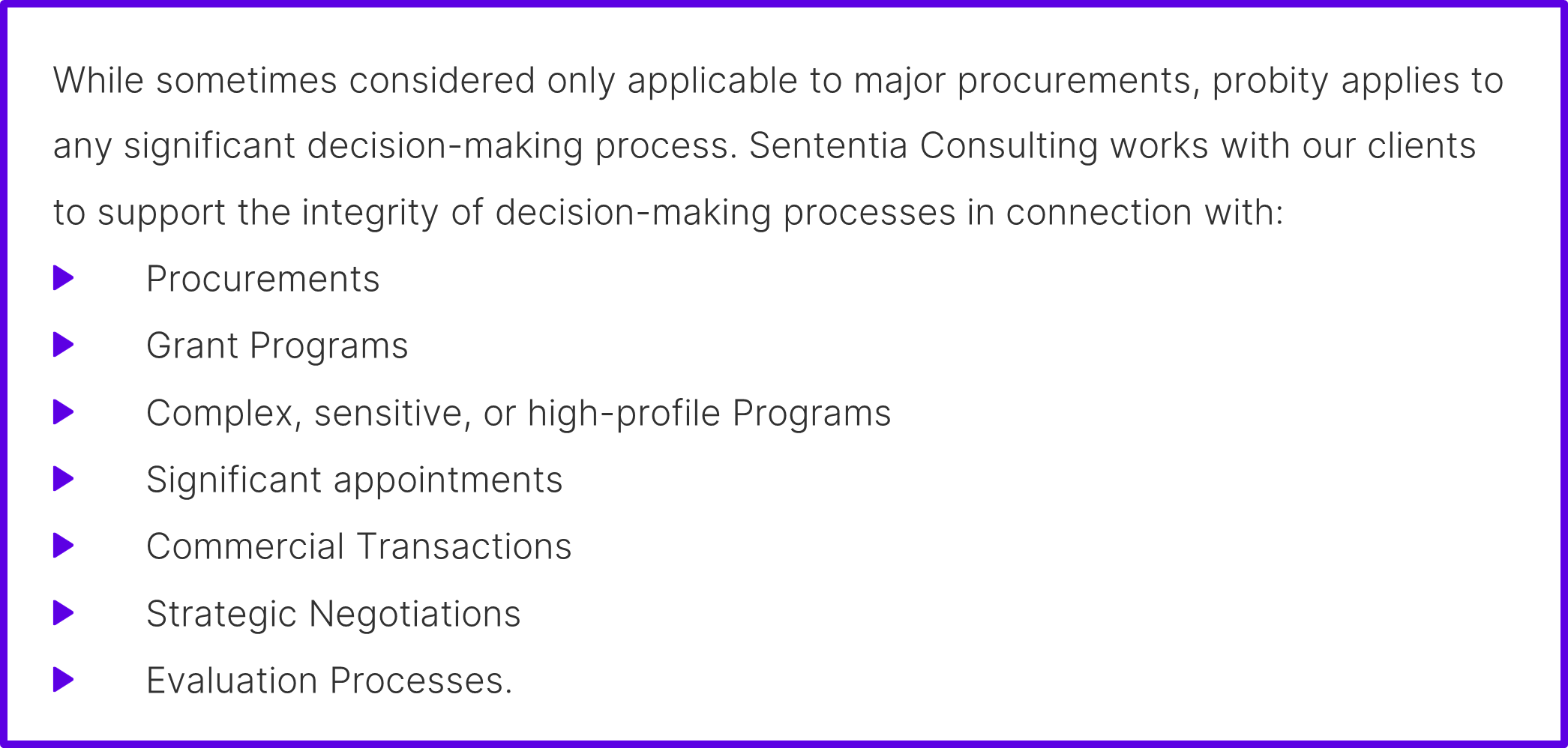Probity & Integrity

“…But this isn’t going to land me in jail, right?”
This was the response I received from a SES officer when I informed them of material probity risks in a significant procurement process for which they were the delegate. Probity is about as exciting as it is understood and therefore not typically front of mind for most public officials when considering key procurement, granting or spending decisions. However, a change in community expectations, a renewed emphasis on integrity by the Government and a series of reputation-damaging missteps by public officials mean that the importance of good probity management is on the rise.
Probity is not a well-known concept and can be difficult for people to understand (so much so that I was once introduced by a client as working for the firm ‘probity’).
So let’s start at the beginning; probity is the evidence of ethical behaviour and means that decisions are made with integrity, honesty and fairness. In a public sector context, good probity management supports transparency, contestability and accountability in decision making, helping entities achieve value for money and withstand external scrutiny or challenge of their decisions.
Probity is more than just the avoidance of corrupt or dishonest conduct, but rather is concerned with making decisions with the right intentions and in good faith, in line with ethical principles and common values. In short, does it ‘pass the pub-test’; where the actions or decisions need to meet community expectations of honesty and fairness, over and above simply being legal or following an established process. In this way, effective probity management helps to support confidence and trust in public sector decision making and mitigates against the reputational damage that can be caused by actual or perceived misconduct.

Probity is a necessary component of good governance and is expected to be demonstrated in any significant decision making process. Working consistent with generally accepted probity principles aligns with the Australian Public Service (APS) Values and is underpinned by certain legislation. Notwithstanding the general importance of probity in the public sector, there have been several developments over the past year that have further emphasised the need for effective probity management and have also highlighted the potential damage that can be caused when individuals or entities fail to uphold ethical principles and community values.

There have been a number of recent and high profile scandals or allegations that have highlighted the significant reputational damage caused to individuals and entities from poor probity management.
Some notable examples include:
Such examples have shown that decisions do not necessarily need to cross the threshold of illegality or misconduct, but need only fail to meet community expectations of transparency, honesty and integrity, to cause individuals to lose positions or organisations to suffer irreparable damage.
These scandals also serve to demonstrate how failures in probity management can severely undermine public confidence in public sector decision making and erode trust in government. As stewards of public resources, the integrity of decision making by public officials has a significant influence on the community’s perception of trust in government. It should then serve as a red flag to officials that there is considerable evidence to suggest that community confidence in all levels of government is on the decline.
For example, the seventh annual Ethics Index published by the Governance Institute of Australia showed that public confidence in the public service and government has eroded year on year. In 2022, the Ethics Index scored public service and government at 38, which was down eight points from the 2021 (46) and 18 points from the 2020 (56) ethics scores. This was against the backdrop of a continual decline in Australia’s overall ethics score, which was recorded in the Ethics Index as 42 in 2022, down from 45 in 2021 and 52 in 2020[1].
While such data may be in contrast to how many public officials consider the integrity of public sector decision making, it is important for officials to recognise that current community sentiment suggests that further attention on probity is needed to restore public confidence in the decisions of the public service and government.
Public officials should also recognise the priority being placed by the current Government on strengthening integrity across the APS. In a series of statements last year, the Minister for the Public Service made clear that the Government wants an APS that is ‘pro-integrity’ and that operates consistent with the standards of the community it serves.
This was followed by the appointment of a new Secretary for Public Sector Reform to design and deliver recommendations to strengthen the public sector; the establishment of an APS Integrity Taskforce to identify gaps and opportunities to deliver system wide integrity improvements; and the promotion of a pro-integrity culture across all levels of the APS, where integrity is championed as a core competency of a professional public service.
The pro-integrity agenda suggests that the Government considers there is room to strengthen the probity of public sector decision making and better uphold community expectations of integrity, accountability and transparency.
In December 2022, the National Anti-Corruption Commission Act 2022 was passed into law, paving the way for the establishment of a powerful and independent National Anti-Corruption Commission (NACC) later this year. The NACC has extensive powers to investigate and report on corrupt conduct that is serious or systemic. As such, the NACC is expected to shine a strong light on the probity of public sector decision making.
The definition of corrupt conduct under the Act is far-reaching and includes:
This means that corrupt conduct does not need to amount to a criminal offence to be investigated by the NACC, but rather only needs to be considered to be serious or systemic. This suggests that severe and deliberate failures in probity may have the potential to fall within the scope of the NACC.
Recent high profile scandals and the declining levels of trust in government indicate that the conduct of public officials and institutions are not consistently meeting public expectations for integrity, transparency and accountability. At the same time, there is a heightened focus of Government on establishing a ‘pro-integrity’ APS, as well as a powerful new federal body on the horizon to investigate potential serious and systemic corrupt conduct. These factors suggest that there is an increasing importance being placed on effective probity management in the public sector, and in ensuring that decisions are made with the right intentions and in good faith – rather than simply being lawful or compliant.
Government entities and officials can no longer afford to take a passive approach to probity management by relying on people to ‘do the right thing’ and operate consistent with the APS values or legislative requirements. But rather, there should be a proactive and robust consideration of probity in any significant decision making process, which seeks to identify and mitigate probity risk throughout all stages of the process. In this way, probity should be at the forefront of the minds of public officials in managing the quality and defensibility of public sector decision making.
Gihan Mallawaarachchi is a Partner at Sententia Consulting and specialises in the provision of probity advice and assurance in the public sector. Sententia Consulting’s team of probity professionals are passionate about helping our clients to better understand and manage the probity risks related to their work.
[1] If you are interested in learning more about the Ethics Index, please visit: https://www.governanceinstitute.com.au/advocacy/ethics-index/
Our team of experts will work closely with you to deeply understand your challenges and find how we can leave you feeling protected, or better equipped to drive change, and impact society.